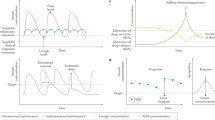Abstract
Local or national policy, patients’ preferences, safety and/or economic concerns, or reimbursement issues may dictate stopping drug in inflammatory bowel diseases (IBD) patients. Sustained deep remission is an important predictor of a better outcome after anti-tumor necrosis (TNF) factor therapy discontinuation, including infliximab (IFX) in IBD patients, but this is not sufficient to prevent future relapse in these patients. In IBD patients under combotherapy, trough level of infliximab (TRI) could be helpful to choose stopping one of the two drugs. In patients on IFX monotherapy, TRI could help to decide reduction of drug dosing, particularly in IBD patients with supratherapeutic trough levels. Incidental findings of undetectable TRI in patients with deep remission may identify a subset of patients who may be considered for IFX cessation. Controlled trials further assessing this issue are eagerly awaited. Pending these trials, clear international recommendations for discontinuing anti-TNF therapy are needed.

Similar content being viewed by others
Abbreviations
- ATI:
-
Antibodies against infliximab
- AZA:
-
Azathioprine
- CD:
-
Crohn’s disease
- CRP:
-
C-reactive protein
- IBD:
-
Inflammatory bowel disease
- IFX:
-
Infliximab
- IMM:
-
Immunomodulator
- TCM:
-
Therapeutic concentration monitoring
- TRI:
-
Trough level of infliximab
- UC:
-
Ulcerative colitis
References
Van der Valk ME, Mangen MJ, Leenders M, et al. Healthcare costs of inflammatory bowel disease have shifted from hospitalisation and surgery towards anti-TNFalpha therapy: results from the COIN study. Gut. 2014;63:72–79.
Dulai PS, Siegel CA, Colombel JF, Sandborn WJ, Peyrin-biroulet L. Systematic review: monotherapy with antitumour necrosis factor alpha agents versus combination therapy with an immunosuppressive for IBD. Gut. 2014;63:1843–1853.
Den Broeder AA, Van Herwaarden N, Van der Maas A, et al. Dose REduction strategy of subcutaneous TNF inhibitors in rheumatoid arthritis: design of a pragmatic randomised non inferiority trial, the DRESS study. BMC Musculoskelet Disord. 2013;24:299.
Pariente B, Laharie D. Review article: why, when and how to de-escalate therapy in inflammatory bowel diseases. Aliment Pharmacol Ther. 2014;40:338–353.
Nanda KS, Cheifetz AS, Moss AC. Impact of antibodies to infliximab on clinical outcomes and serum infliximab levels in patients with inflammatory bowel disease (IBD): a meta-analysis. Am J Gastroenterol. 2013;108:40–47.
Paul S, Moreau AC, Del Tedesco E, et al. Pharmacokinetics of adalimumab in inflammatory bowel diseases: a systematic review and meta-analysis. Inflamm Bowel Dis. 2014;20:1288–1295.
Louis E, Jy Mary, Vernier-Massouille G, et al. Maintenance of remission among patients with Crohn’s disease on antimetabolite therapy after infliximab therapy is stopped. Gastroenterol. 2012;142:63–70.
Drobne D, Bossuyt P, Breynaert C, et al. Withdrawal of immunomodulators after co-treatment does not reduce trough level of infliximab in patients with Crohn’s disease. Clin Gastroenterol Hepatol. 2015;13:514–521.
Papamichael K, Vande Casteele N, Gils A, et al. Long-term outcome of patients with crohn’s disease who discontinued infliximab therapy upon clinical remission. Clin Gastroenterol Hepatol. 2014;S1542–3565:01720.
Van Assche G, Magdelaine-Beuzelin C, D’Haens G, et al. Withdrawal of immunosuppression in Crohn’s disease treated with scheduled infliximab maintenance: a randomized trial. Gastroenterol. 2008;134:1861–1868.
Vande Casteele N, Ferrante M, Van Assche G, et al. Trough concentrations of infliximab guide dosing for patients with inflammatory bowel disease. Gastroenterol. 2015.
Paul S, Roblin X, Peyrin-Biroulet L, et al. Infliximab de-escalation guided by therapeutic drug monitoring in inflammatory bowel disease patient: a proof of concept study. Submitted.
Sandborn WJ, Hanauer SB, Rutgeerts P, et al. Adalimumab for maintenance treatment of Crohn’s disease: results of the CLASSIC II trial. Gut. 2007;56:1232–1239.
Ben-Horin S, Chowers Y, Ungar B, et al. Undetectable anti TNF drug levels in patients with long term remission successful drug withdrawal. Aliment Pharmacol Ther. 2015.
Vaughn BP, Martinez-Vazquez M, Patwardhan VR, Moss AC, Sandborn WJ, Cheifetz AS. Proactive therapeutic concentration monitoring of infliximab may improve outcomes for patients with inflammatory bowel disease: results from a pilot observational study. Inflamm Bowel Dis. 2015;20:1996–2003.
Adedokun OJ, Sandborn WJ, Feagan BG, et al. Association between serum concentration of infliximab and efficacy in adult patients with ulcerative colitis. Gastroenterology. 2014;147:1296–1307.
Imaeda H, Bamba S, Takahashi K, et al. Relationship between serum infliximab trough levels and endoscopic activities in patients with Crohn’s disease under scheduled maintenance treatment. J Gastroenterol. 2014;49:674–682.
Roblin X, Marotte H, Leclerc M, et al. Combination of C-reactive protein, infliximab trough levels, and stable but not transient antibodies to infliximab are associated with loss of response to infliximab in inflammatory bowel disease. J Crohns Colitis. 2015;9:525–531.
Author information
Authors and Affiliations
Corresponding author
Ethics declarations
Conflict of interest
Nicolas Williet and Stephane Paul have no conflict of interest. Laurent Peyrin-Biroulet has received consulting and/or lecture fees from Merck, Abbott, Janssen, Genentech, Mitsubishi, Ferring, Norgine, Tillots, Vifor, Shire, Therakos, Pharmacosmos, Pilège, BMS, UCB-pharma, Hospira, Takeda. Xavier Roblin has received consulting and/or lecture fees from MSD, Abbvie, Hospira.hac pharma, Théradiag, Takeda.
Rights and permissions
About this article
Cite this article
Williet, N., Paul, S., Peyrin-Biroulet, L. et al. Pharmacokinetics of Infliximab and Reduction of Treatment for Inflammatory Bowel Diseases. Dig Dis Sci 61, 990–995 (2016). https://doi.org/10.1007/s10620-015-3984-2
Received:
Accepted:
Published:
Issue Date:
DOI: https://doi.org/10.1007/s10620-015-3984-2




